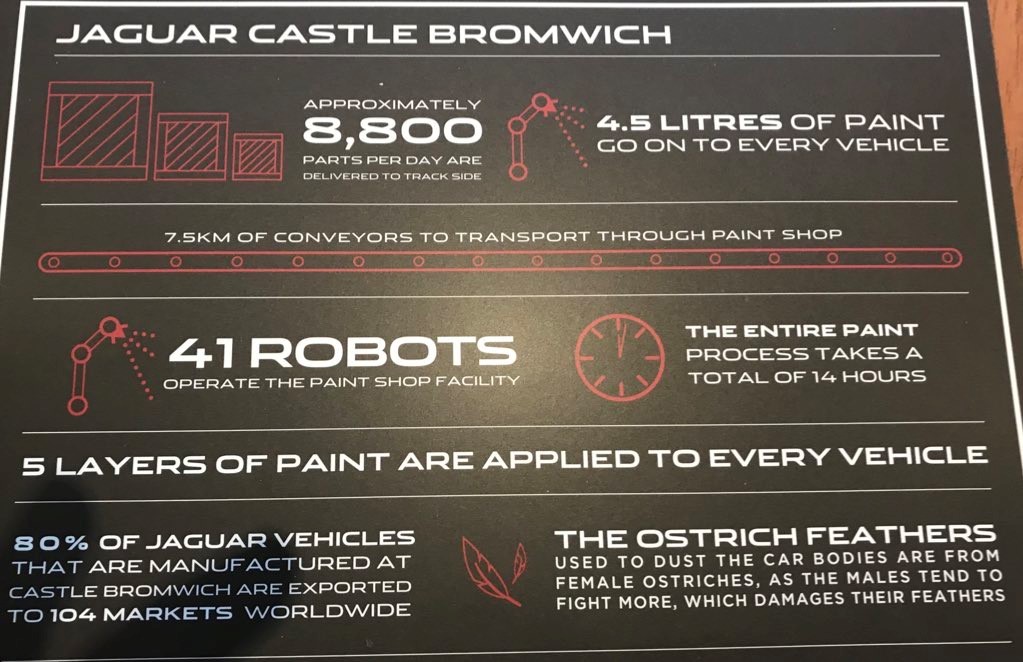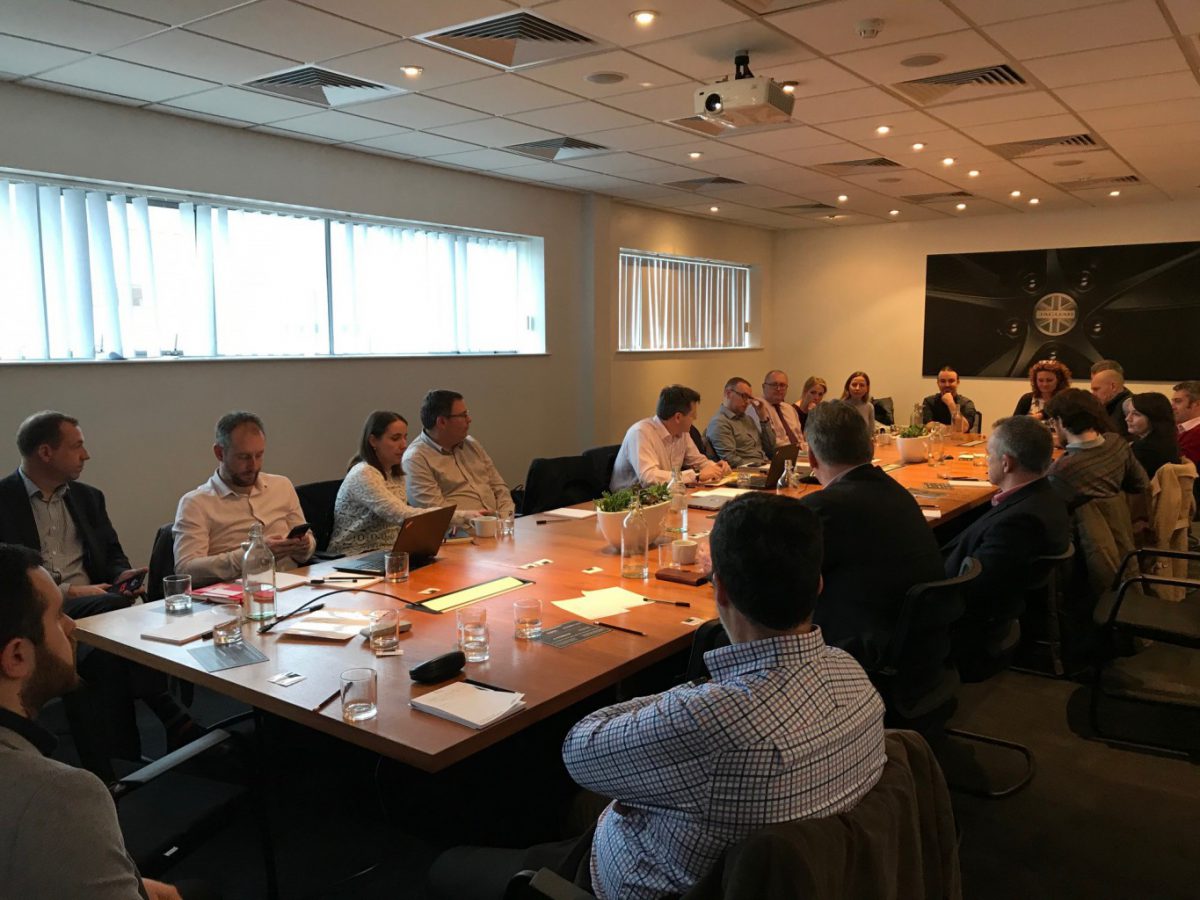The Constructing Excellence Offsite Manufacturing and Technology Group were delighted to visit to the Jaguar Land Rover Castle Bromwich Facility on 10th March – just before the current crisis hit! The visit provided an excellent opportunity to get behind the scenes at one of the most advanced automotive plants in Europe.
Automotive is widely recognised as one of the industries that construction can learn most from and this visit will provide an opportunity to get under the skin of how automotive is applying advanced manufacturing techniques to improve productivity and quality. We also had an opportunity to gain insight into the Construction Innovation Hub’s Quality workstream which draws on experience from the automotive and aerospace sectors. Construction Quality Planning (CQP) applies to new construction products being produced and delivered at scale, using manufacturing-led approaches. It is a quality toolset aimed at ensuring that components, sub-assemblies or assemblies meet the required standards.
Here are our top 10 takeaways from the day:
- Shift from quality checking to defect prevention
The manufacturing sector very much employs a defect prevention approach. Something that is very much missing from the construction sector. Mainstream construction relies on quality checking. It’s difficult to quantify the impact of this on customer satisfaction and the financial impact but the Get It Right Initiative estimate the cost in the UK to be between £10-25 billion per annum. The Construction Innovation Hub is producing a Construction Quality Toolkit that considers how this manufacturing thinking can be applied in construction context. The Hub will be working with CE to consult on the CQP process more widely in coming months
- Change won’t happen overnight
The shift from a site-based industry to a manufacturing-based industry will not happen quickly. The Construction Innovation Hub is tasked with demonstrating impact in 10 years, through focussing on those who are most willing to change. However wholesale change will take much longer and require a complete shift in roles and approach in construction. Automotive took decades to reach its current level of sophistication and many companies who were unwilling or unable to adapt went under.
- Shift to Zero Carbon
Delegates were inspired by the potential of a quality focus to meet the zero carbon and sustainability challenge. Using components and systems that fit together properly will have enormous implications on waste minimisation on site as well as through life performance through better air tightness.
- To overengineer or not to over engineer?
Safety factors in standards are there to allow for poor process and low levels of accuracy. Over-engineering is not a bad thing if it can maximise production efficiency, lower maintenance costs and enable standardisation. This was apparent on our tour of the JLR factory where the same base plate was used for both convertible and coupe F-Type Jaguars. The approach is very much to decide on the standard that meets the majority of needs and then deal with others.
5. Understanding where to focus
The Construction Innovation Hub outlined the approaches used to understand the difference between critical and significant items – and where to therefore focus effort. Classifying products based on historical evidence and not subjective evidence enables resources to be focussed on the right areas. Unlike existing construction design processes the base standard for each new product is based on the previous approach. One only needs to look at the success of Toyota who do not use untested technology to see the advantages of this approach.
- Supply chain and logistics
Delegates were struck when touring the factory by the logistics arrangements. DHL were in the factory delivering to line-side – operating a truly just in time delivery model. The F-Types are made to order and the parts for each specific vehicle configuration were delivered line-side just prior to the car arriving at that point in the production line. Working in partnership with the logistics company ensures that the logistics are the responsibility of the experts right through to getting the right component to the right point on the line at the right time. This places risk with the organisation best placed to manage and mitigate that risk.
- Skills
Over the years the Castle Bromwich factory has significantly reduced its workforce and increased the use of robotics and automation, this has been done through natural wastage as the existing workforce retired. The factory is very much a multi-skilled environment, where people have the ability to learn different skills and jobs on the production line. This is a clear advantage of productionised systems where companies can recruit locally and upskill. The approach is very much around less people doing different jobs – this will be of significance to the construction sector where there is an increasing skills shortage.
- Equality, Diversity & Inclusion
Delegates were struck by positive practices around creating a no blame culture and a strong focus on worker welfare (health monitoring stations and links to occupational therapy were prominent at the entrance to the production line). The working environment was comfortable and clean and the need for heavy lifting had been eliminated. Despite this a limited number of female workers were observed while touring the facility, indicating that automotive may have similar issues to construction in attracting female operatives.
- Continuous Improvement
Delegates were impressed by the strong focus on continuous improvement. This was visibly demonstrated throughout the factory with at diagrams at each station along the production line. The approach that the Construction Innovation Hub are employing embodies that gated approvals process meaning that delays and potential delays are flushed out early.
- Circular economy
Even though there is a strong focus on re-use and end of life within the automotive sector, delegates felt that the construction industry were ahead in this area. It would be difficult to de-construct the vehicle through the process they use. Demountability should be a major focus for future construction based platform approaches.
The visit was organised in collaboration with the Construction Innovation Hub and with support from Tata Steel and Pinsent Masons.
The CE Offsite Manufacturing & Technology Group will be meeting virtually on 30 April to discuss what impact COVID 19 will have on manufacturing and technology. https://www.eventbrite.co.uk/e/how-will-covid-19-impact-offsite-manufacturing-technology-tickets-102176935966



Comments are closed.